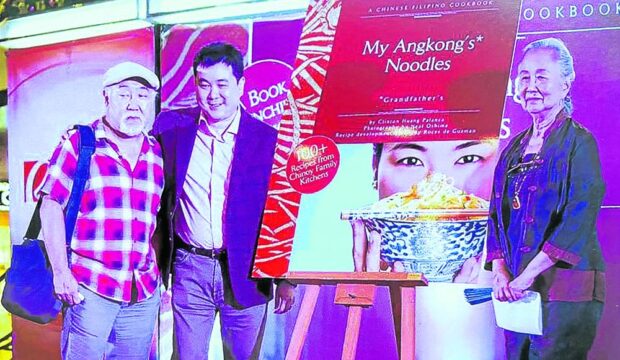
FIRST EDITION Neal Oshima, Clinton Palanca and Elizabeth Gokongwei at the launch of “My Angkong’s Noodles” back in October 2014 —Contributed photo
A bestselling Chinese-Filipino cookbook with a quirky-sounding name could eventually make its international debut as the heirs of the late Elizabeth Yu-Gokongwei breathe new life into their mother’s first ever book project.
“My Angkong’s Noodles” (My Grandfather’s Noodles), published in 2014 by Gokongwei with the celebrated and award-winning food writer Clinton Palanca, saw the successful launch of its third edition earlier this year.
The book features over 100 recipes collected from Chinese-Filipino kitchens, making the publication a rare treasure for those interested in how to prepare traditional Chinoy recipes, and Fujianese food in particular.
For Palanca, who earned a doctorate in food anthropology in London, this was the cuisine that “the world forgot.”
“If this book can introduce a new generation of Chinese Filipinos to the cuisine of their parents and grandparents, then we’ll be happy enough, but we have written and photographed this book in the hope that anyone with the inclination to browse and try a recipe or two will find something they like in this undeservedly neglected cuisine,” wrote Palanca.
While Mrs. Gokongwei and Palanca passed away months apart in 2019, their families and friends have not forgotten their shared dream to bring traditional Chinoy recipes to a broader audience.
Lisa Gokongwei-Cheng, head of the family’s Summit Media group, reveals even larger plans for “My Angkong’s Noodles.”
“I’m thinking: either we make a documentary of this or a website that features all the recipes. That’s my next project,” she says in an interview.
“I’m also looking for a publisher that can take this outside of the Philippines because Fujian cooking is becoming more popular around the world,” she adds.
All proceeds from the sale of the books will go to the Gokongwei Brothers Foundation, the education-focused charity arm of the Gokongwei Group.
Instant hit
“My Angkong’s Noodles” was an instant hit the moment it was launched, partly thanks to the covert efforts of Mrs. Gokongwei’s husband, the late taipan John Gokongwei Jr.
READ: A long-overdue book on Fujianese cuisine–thanks to Elizabeth Gokongwei
Because this was his wife’s first book project, he was determined to make the launch a success, Cheng recalls.
He quietly nudged his bankers, suppliers and vendors to secure a copy of the book when it made its debut nearly a decade ago.
“I think the first 1,000 copies were kind of like ‘you better buy my wife’s book’,” Cheng quips.
This paved the way for the publication of a second edition the following year, which was also quickly sold out.
“It took a long time—almost 10 years [for the third edition]. I think everyone got busy and then COVID happened,” Cheng says.
“My Angkong’s Noodles” features classic Fujianese cooking but influenced by Filipino culture, ingredients and taste. Within its pages, readers will find recipes for oyster cake, pata tim, roast pork asado, lumpia, fried misua and almond jelly. Chapter 1 fittingly opens with the staple rice, which is showcased using various recipes for lugaw, or rice porridge, from its most basic iteration to more opulent versions, such as with pork and mushrooms and Sa Ong Neng or three emperor egg.
Palanca’s zingy wit and mastery of food writing provides an added treat for readers.
“Aside from showing off the versatility of the egg and the myriad of forms it can take, it is a protein and umami-rich side dish, which complements lugaw for a large feast as much as it does for a toothless invalid,” he wrote of Sa Ong Neng.
Tribute to grannies
Ginny Roces de Guzman, founder of Sugarhouse restaurant, synthesized each recipe in “My Angkong’s Noodles,” which was then photographed by master lensman Neal Oshima.
Essays on food and culture were provided by Mara Coson, Rafa Ongpin, Jeffrey Yap and the late Doreen Fernandez, while this new edition includes an introductory essay from L. Ling-chi Wang, professor of Asian-American and Asian diaspora studies in the University of California-Berkeley.
Mrs. Gokongwei, who was known to show her love to family and friends through her food, called My Angkong’s Noodles, a tribute to the “immigrant grandmothers and great grandmothers who had to work daily at the stove.”
“We hope that the recipes you find in this book will not merely stay within these pages but be cooked by generations in the future, and bring families closer together,” she wrote.